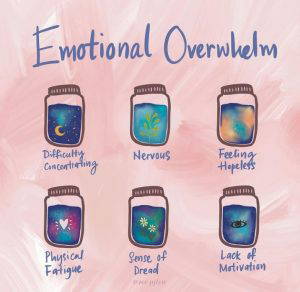Being aware of our emotional load and knowing when it’s becoming too much is a careful balancing act.
Physical overwhelm is probably easier to recognise for most of us; back pain or a headache which means we have to stop and take notice, even go to bed.
Emotional overwhelm is often different for each of us and thus easily brushed off or ignored (at least initially).
Recognising when you are getting emotionally overwhelmed can avoid burn out and a rise in anxiety or depression.
Some of the symptoms above might resonate with you and it’s worth noting these down.
For me it’s a feeling of nervousness and irritability that bubbles over in to my relationships and ability to relax and let go.
If I don’t spend time with my feelings they start to escalate and trigger anxiety and busyness.
Over the years I have learnt to recognise when emotional overwhelm is on the horizon. My plan of action is to remove myself, book time in to think, read and dream. Sitting in nature and finding a green place always works for me.
Your action plan may be totally different and should be tailored to what you feel you need. Change and adapt to what feels right.
If you have ADHD or Autism your overwhelm capacity will be reduced and also may not show up in a neurotypical way. Gently working out how you feel and what you need in a daily practice can help but do ask for support from others who know you.
Try not to ignore the signs and be kind to yourself, as you begin to recognise your emotional overwhelm symptoms. I think of having an inner caretaker, asking myself how I am doing in there!
If you find it hard to assess your feelings take some time out to breathe, then tune in to yourself. Just listen and your feelings will gently unfurl.
Overwhelm is normal and with care and self love will pass. Remember the quote:
You are the sky, everything else is the weather


